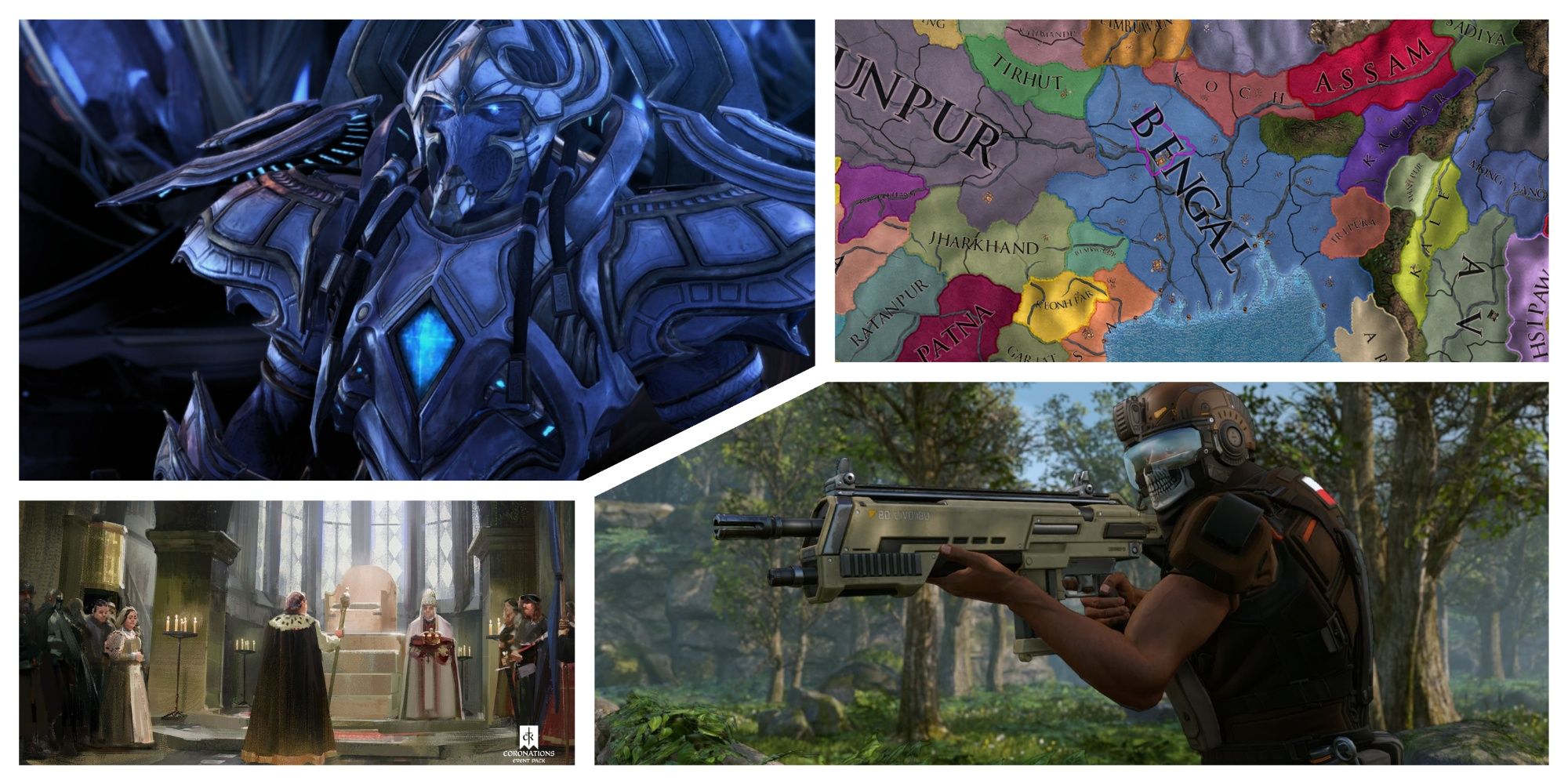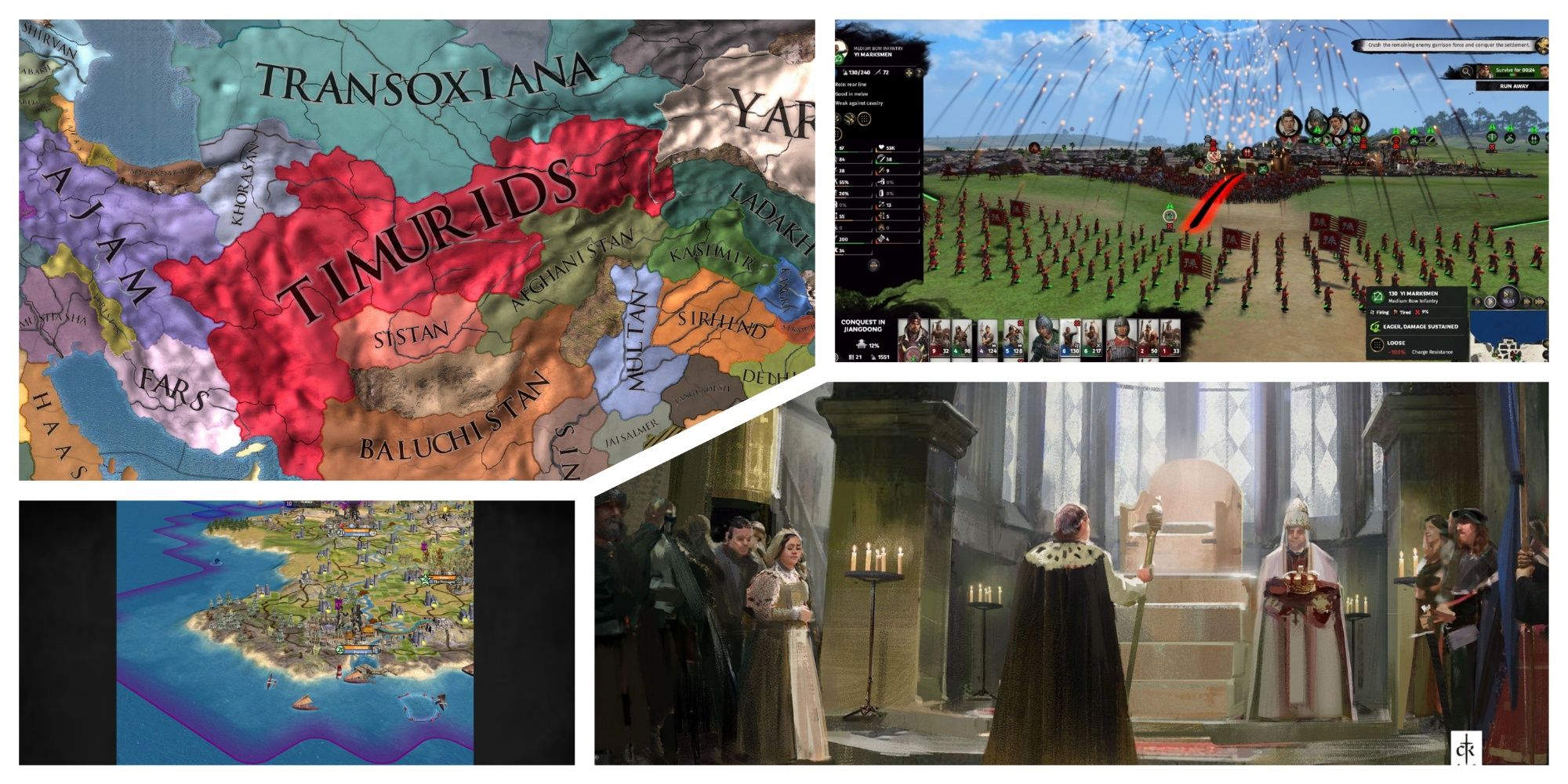Summary
- Modern strategy games demand teamwork and coordination for success.
- Titles like Northgard emphasize tactical teamwork and specialist roles.
- Stellaris elevates cooperation to build galactic empires through diplomatic alliances.
Some strategy games want players to go at it alone. But the best ones turn every round into fast-paced, team-powered fun where trust and a bit of creative chaos set the tone. Modern multiplayer strategy games demand more from their players than sharp reflexes—they call for communication, problem-solving, and the kind of coordinated moves usually reserved for heist films.

Related
Best Strategy Games That Are Punishing But Fair, Ranked
Strategy games are extremely fun to play, as they offer variety and excitement. Here are some titles in the genre that are punishing but fair.
Take Stellaris and Hearts of Iron 4. Building empires is only the beginning; these games test a team’s ability to mesh ideas, broker alliances, and spin disorder into tactical teamwork. In these games, each player is a specialist with a critical role, and the only way to succeed is to execute the plan together. Therefore, this list gives the fans the titles that reward not just the sharpest minds but also the most cohesive teams.
8
Northgard
Viking Clans and the Art of Role-Based Strategic Synergy
Northgard stands out for its clever clan system, weaving teamwork straight into the bones of its Viking-flavored strategy. Managing resources, expanding territory, and surviving the harsh winters are all part of the job. In team modes, especially the popular 3v3 format, true collaboration is the only path to victory.
A team must unify behind a single strategy, often supporting one player best positioned for a specific win while others adopt defensive or disruptive roles. Northgard shines in how the design itself nudges players toward working together. No explicit bonus is needed, because victory itself is the shared reward for perfect synergy.
7
Total War: Warhammer 3
Conquering the Old World With Simultaneous Turns and Gifted Units
Total War: Warhammer 3 lets up to eight players conquer, scheme, and brawl across the Old World. While some early turns can feel solo, true teamwork comes alive when armies join forces—players can gift units, split command, and execute classic “hammer and anvil” tactics that no solo player could ever pull off.
The game’s biggest strength lies in its tactical battles. When an ally is attacked, players can join the fight and even be given control over units from their teammate’s army. This ability to coordinate simultaneous turns, share resources, and build military alliances adds layers to both campaign and battle planning.
6
Company of Heroes 3
Combined Arms and Battlegroup Synergy on the Frontline
If any player tries to win Company of Heroes 3 alone, the match is as good as over. The action takes place across the Mediterranean in WWII, and the path to victory is paved with well-timed combos. Solo heroics won’t cut it here because isolated units are easy prey for coordinated teams.
At the heart of its cooperative strategy lies the Battlegroup system. Players choose unique sub-factions, letting a squad mix and match specialties for maximum effect. One player might focus on rolling out late-game tanks, while another keeps the skies busy with paratroopers. This mix-and-match setup lets teams try everything from stonewall defenses to lightning assaults.
5
Beyond All Reason
Beyond All Reason is defined by its massive scale, with battles involving thousands of units and a complex streaming economy. In the primary 8v8 game mode, it is impossible for one player to manage everything, which has led to the community developing a deeply ingrained and highly specialized set of team roles: Frontline, Tech, Eco, and Air.

Related
7 Grand Strategy Games With The Most Freedom, Ranked
Grand Strategy games are extremely entertaining and challenging. Here are some great titles in the genre with the most freedom.
In-game facilitation tools are robust, from map drawings to resource sharing, and the strategic depth comes not just from what is built, but how roles mesh across the team. Success demands absolute trust and timing, and the only real reward is guaranteed victory.
4
Age of Empires 2: Definitive Edition
The Unforgiving Art of Pocket Vs. Flank
Age of Empires 2 has stood as a titan of competitive strategy, and its team game meta is a masterclass in player-driven depth. In competitive team games, players are assigned roles based on their map position: “flank” players on the outside, and “pocket” players protected in the center.
This positioning dictates everything. Flank players are expected to pick aggressive archer civilizations to control the early game, while pocket players must use mobile cavalry civilizations to support either flank at a moment’s notice. For those who crave a challenge, AoE2 offers one of the most demanding and rewarding team experiences in the genre.
3
StarCraft 2
Perfectly Engineered PvE Synergy and Deep Commander Progression
StarCraft 2’s co-op Missions are masterclasses in two-player PvE design, transforming a famously competitive 1v1 game into one of the most compelling team-based experiences available. In this mode, two players select from a roster of unique Commanders and tackle challenging objective-based scenarios against a powerful AI.
The mode is built from the ground up to facilitate and reward teamwork. Most importantly, the game features a robust and satisfying progression system where players level up their Commanders to unlock new units and permanent power boosts. This creates a powerful and tangible reward loop that is explicitly tied to successful teamwork, making every victory a step toward greater shared power.
2
Hearts of Iron 4
The Ultimate Coalition Warfare Simulator
Hearts of Iron 4 delivers one of the most demanding and profound teamwork experiences in all of gaming by elevating cooperation to the strategic center of its gameplay. Every multiplayer match is a sprawling coalition war, where one player’s failure to deliver tanks or fighters can topple entire fronts.
National specialization and lend-lease systems create a web of dependencies: the UK holds the skies, the US floods the Allies with equipment, Germany spearheads breakthroughs, and minor powers fill the ranks. There are no solo victories here—teams must plan, execute, and adapt across years of virtual conflict. Victory is collective, and defeat is always shared.
1
Stellaris
Building Galactic Empires Together Through Diplomacy
No game puts teamwork at the cosmic level quite like Stellaris. Its Federation system isn’t just a treaty—it’s an evolving alliance, with custom perks, shared navies, and a group victory condition. Players can specialize in empires (science, military, economy) for maximum synergy, and the ability to literally co-pilot a single empire sets a new bar for team-based play.
The game allows players to govern together, shaping joint economic policies and commanding a shared Federation Fleet built from the best technology of all member empires. With a dedicated co-op mode allowing multiple players to control a single empire, Stellaris stands as the definitive benchmark for rewarding strategic teamwork.

More
8 Most Complex Strategy Games, Ranked
These are some of the most complicated strategy games for players who are fans of the strategy genre.
#Strategy #Games #Reward #Teamwork #Ranked

